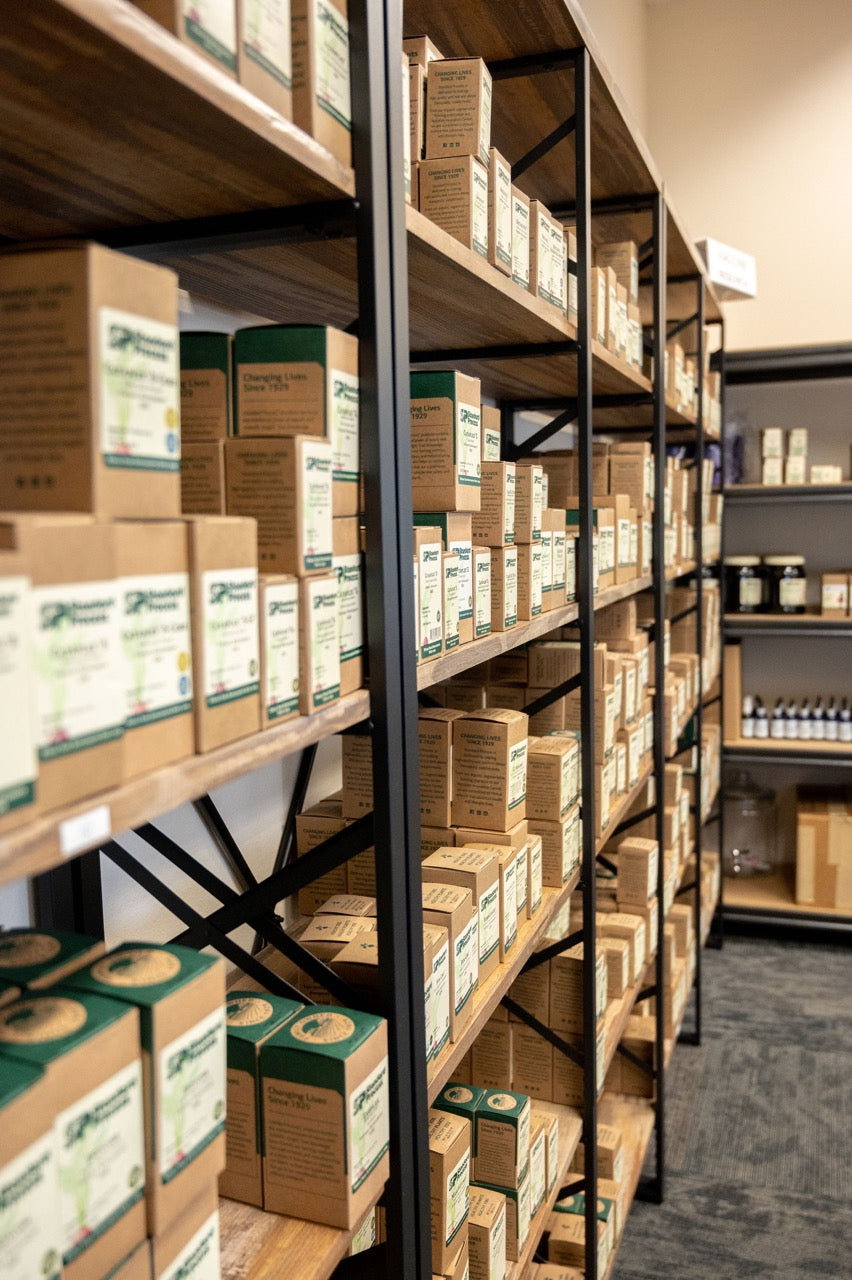Echinacea: Benefits for the Immune System and Natural Cold & Flu Remedy
Echinacea is a versatile plant hailing from North America, known for its remarkable healing properties. Native Americans relied on it for treating many health conditions, reinforcing its medicinal credibility. Not just a pretty flower, Echinacea earns its praise as it's considered effective in mitigating the severity and duration of colds, upper respiratory infections, and the flu. Taking a stroll through our site will usher you into the world of this wonder plant
Echinacea is often promoted as a dietary supplement to support the immune system and potentially reduce the risk of catching a cold. While it may offer some immune support, it's important to consult with a healthcare provider before using echinacea, as its effectiveness and safety can vary based on individual health conditions.

What is Echinacea?
Echinacea is an intriguing plant that has been used for its medicinal properties for centuries. Native to North America, it was highly valued among Native American tribes for its diverse medicinal uses. This resilient, daisy-like flower with striking spiky centers has captivated the attention of both traditional healers and modern medical researchers.
Known botanically as Echinacea purpurea or Echinacea angustifolia, it's essential to note that not all species or preparations of echinacea are the same. There are several species within the Echinacea genus, but when it comes to dietary supplements, Echinacea purpurea and Echinacea angustifolia are the most commonly used. Their roots contain a blend of active compounds such as alkamides, glycoproteins, and polysaccharides, contributing to their potential immune-boosting properties.
When selecting an echinacea supplement, it's crucial to be well-informed about its source, preparation, and specific species used. It’s advised to rely on reputable sources such as NHICenter, which provide comprehensive information on echinacea products and their potential benefits.
Consider this - just as soil types can significantly affect the flavor and nutritional composition of vegetables, emerging research suggests that the effect of echinacea on immune cells may depend on the types and amounts of bacteria within the plants and the composition of soil in which they grow. This further emphasizes the importance of knowing where and how your echinacea supplement is produced.
Understanding this crucial distinction can make a world of difference in terms of both efficacy and safety. Additionally, scientific evidence indicates that while echinacea may slightly reduce the likelihood of catching a cold, it does not necessarily shorten its duration. It's essential to be well-informed about these nuances when considering echinacea as part of your health regimen.
With these insights in mind, we have gained a deeper understanding of what echinacea truly is and why it's crucial to be discerning when choosing an echinacea product.
With a solid foundation on the basics of echinacea in place, let's now explore its remarkable healing properties in greater detail.
The Healing Properties of Echinacea
Echinacea isn't just another plant rooted in the ground; it’s grown in people's trust as a reliable natural remedy for various conditions. It is believed to contain active substances that stimulate the immune system, increasing the production of white blood cells. This boost in immunity can help the body fight off illnesses such as colds, upper respiratory infections, and even flu.
Echinacea has garnered attention not only for its potential to shorten the duration of these illnesses but also for reducing their severity. Imagine being able to bounce back from a cold or flu faster, with less discomfort and interruption to your daily life.
Studies have suggested that Echinacea may possess antiviral and anti-inflammatory properties, which contribute to its capacity to tackle these conditions. However, it's important to remember that while some research supports these claims, more comprehensive studies are still needed to definitively establish these effects.
In addition to its potential to provide relief from colds and flu, Echinacea's immunostimulant effects have sparked interest in its ability to support overall immune system health. By aiding the body's natural defense mechanisms, it is believed to enhance the body's resilience against a range of common illnesses.
With these healing properties attributed to Echinacea, it's understandable why it has become a popular remedy for many who seek natural alternatives in managing their health.
Now, let's explore further the significant antibacterial and anti-inflammatory effects that Echinacea brings to the table.
Antibacterial and Anti-Inflammatory Effects of Echinacea
When it comes to natural remedies, Echinacea stands out for its remarkable capabilities in fighting off infections and reducing inflammation in the body. These effects are made possible by certain active compounds found in Echinacea—flavonoids and alkamides. Flavonoids act as powerful antioxidants that protect the body from free radicals and boost the immune system, while alkamides contribute to the overall medicinal benefits of Echinacea.
The antibacterial effects of Echinacea are particularly significant. Studies have shown that Echinacea extracts exhibit antibacterial activity against a range of pathogens such as Staphylococcus aureus and Streptococcus pyogenes, inhibiting the growth of harmful bacteria and potentially reducing the risk of bacterial infections in the body. These findings underscore Echinacea's potential as a natural, alternative way to prevent and combat bacterial infections without resorting to traditional antibiotic treatments.
Moreover, Echinacea has been found to stimulate the production of immune cells, such as macrophages and natural killer cells, which play a crucial role in the body's defense against infections, thereby aiding in fortifying the body's natural defenses against invading pathogens.
Moving on to its anti-inflammatory effects, Echinacea contains compounds with anti-inflammatory properties that help modulate the body's immune response, offering relief from symptoms caused by inflammation. For instance, individuals suffering from conditions such as rheumatoid arthritis or respiratory conditions may find relief from the anti-inflammatory effects of Echinacea.
With its profound antibacterial and anti-inflammatory effects, it's clear that Echinacea holds great potential not only as an immune-boosting remedy but also as a complementary approach to combat various infections and reduce inflammation within the body.
By understanding how Echinacea affects the immune system at a cellular level, we can gain deeper insights into its holistic benefits. Let's now turn our attention to exploring the specific effects of Echinacea on immune cells and overall immune function.
Effects of Echinacea on the Immune System
Echinacea has received considerable attention for its potential to reinforce the immune system and provide protection against infections. Understanding how it interacts with the immune system can shed light on its role as a natural remedy for colds and flu.
Research suggests that one way in which Echinacea may benefit the immune system is by stimulating the activity of white blood cells, which are frontline defenders in our body's immune response, crucial for recognizing and attacking foreign invaders like bacteria and viruses.
Activation of Immune Cells by Echinacea Compounds
Additionally, polysaccharides found in Echinacea have been shown to stimulate the production of white blood cells, potentially enhancing the body's ability to combat infections. This multifaceted action on various components of the immune system underscores the complex role that Echinacea plays in supporting our body's defense mechanisms.
With this deeper understanding of how Echinacea activates immune cells, let's now explore its potential benefits for strengthening overall immune function and protection against infections.
Different Species of Echinacea
Echinacea, known as the purple coneflower, includes several species, but the most commonly used for dietary supplements and herbal remedies are Echinacea purpurea and Echinacea angustifolia. Although they share similar properties, their unique compositions set them apart, affecting their effectiveness in treating various health conditions.Echinacea purpurea is often favored for its high levels of alkamides, believed to support the immune system. Conversely, Echinacea angustifolia is known for its potential to reduce the duration and severity of cold symptoms. Both species offer beneficial properties, but understanding their uniqueness allows us to make informed choices when using echinacea for our health.
Comparative Analysis
The levels of active compounds in different echinacea species significantly vary. For example, a comparative analysis of echinacoside, a key compound in Echinacea, has revealed variations across different species. This variation underscores the importance of understanding the specific properties and potential applications of each echinacea species.● Echinacea purpurea: Contains high levels of alkamides, which are believed to support the immune system.
● Echinacea angustifolia: Known for its potential to reduce the duration and severity of cold symptoms.
● Echinacea pallida: Rich in phenolic compounds, which have antioxidant and anti-inflammatory properties.
By exploring the distinct characteristics of these various echinacea species, we can gain a deeper insight into how they may be applied to address different health needs.
For instance, if someone is focused on bolstering their immune system against common illnesses such as colds or flu, Echinacea purpurea might be a suitable choice due to its immune-supportive properties derived from alkamides. Conversely, someone seeking relief from cold symptoms may find Echinacea angustifolia more beneficial due to its potential to alleviate the severity and duration of such symptoms.
With a clearer understanding of the distinct characteristics and applications of different echinacea species, individuals can confidently choose the most suitable echinacea variety to address their specific health needs. Armed with an understanding of the distinctions among echinacea species, let's now turn our attention to the varied uses of echinacea in herbal medicines and remedies.
Echinacea in Herbal Medicines and Remedies
 Echinacea has been used for generations by Native Americans for various health purposes. Its popularity in herbal medicines and remedies is well-deserved, considering the potential benefits it offers for immune support and combating cold and flu symptoms. This natural plant has found its way into numerous formulations aimed at alleviating common ailments and boosting overall health.
Echinacea has been used for generations by Native Americans for various health purposes. Its popularity in herbal medicines and remedies is well-deserved, considering the potential benefits it offers for immune support and combating cold and flu symptoms. This natural plant has found its way into numerous formulations aimed at alleviating common ailments and boosting overall health.One of the key attractions of using Echinacea in herbal remedies is its ability to stimulate the immune system. By promoting the production of white blood cells, Echinacea can enhance the body's natural defense mechanisms, potentially reducing the severity or duration of colds and flu. This immune-boosting property has made Echinacea a staple ingredient in various over-the-counter supplements and holistic health practices.
Through our website NHICENTER, individuals can obtain comprehensive information on the role of Echinacea in herbal medicines and remedies, empowering them to make informed choices about incorporating this natural ingredient into their holistic health practices.
As we delve deeper into the world of herbal remedies, it becomes evident that Echinacea plays a vital role in supporting immune health and alleviating common ailments. Let's further explore how this botanical powerhouse continues to shape the landscape of natural wellness products.
Best Ways to Use Echinacea for Cold and Flu
When it comes to fighting off colds and flu, echinacea is like your immune system's trusty sidekick. Fortunately, there are several different ways to consume echinacea, providing flexibility based on personal preferences and the severity of symptoms. Let's explore these options in detail.Echinacea Tea
Echinacea tea is a soothing and popular method for combating colds and flu. It's an excellent choice for those who prefer a warm, comforting drink when under the weather. Brewing a cup of echinacea tea with honey can offer relief for sore throats. The effectiveness of echinacea tea can depend on steeping time and quality of the herb used, so choosing high-quality products is crucial.Echinacea Tinctures
For those who prefer a more concentrated and convenient form of echinacea, tinctures are an excellent option. These liquid extracts are easy to carry around and can be added to water or juice for consumption. Choosing tinctures made with high-quality echinacea herbs and following the recommended dosage can yield the best results.Echinacea Capsules
Echinacea capsules offer a convenient way to take this herbal remedy, providing a measured dose of echinacea that is easy to swallow—preferred by many individuals. Following the recommended dosage on the product label is crucial, especially if you have underlying health conditions or are taking other medications.Echinacea Extracts
Our site provides practical guidance on the most effective methods for using echinacea to manage cold and flu, empowering users to make informed choices.
Understanding the diverse ways in which echinacea can be utilized ensures that you have access to its immune-boosting benefits in forms that align with your preferences and needs, offering flexibility while addressing cold and flu symptoms effectively.
Now equipped with an understanding of how to derive the most from Echinacea, let's move on to exploring the associated safety concerns and necessary precautions when using this natural remedy.
Safety Concerns and Precautions with Echinacea Use
Echinacea is generally considered safe for short-term use in healthy adults, but taking certain precautions is important. It's always wise to consult with a healthcare provider before starting any new supplement, especially for individuals with specific health conditions or those taking medications. This is to ensure that any potential interactions with echinacea are well understood, and to minimize any associated risks.For example, echinacea may not be suitable for people with autoimmune disorders such as rheumatoid arthritis, lupus, or multiple sclerosis, as it may stimulate the immune system and exacerbate these conditions. Individuals with allergies should also exercise caution, as allergic reactions to echinacea can occur, though they are rare. Furthermore, the safety of long-term use of echinacea remains uncertain, and there have been reports of digestive tract symptoms and allergic reactions in some individuals. While the risk of interactions between echinacea supplements and most medications is low, it's always advisable to discuss any complementary health approaches, including echinacea use, with a healthcare provider to ensure its safety and suitability.
Consider this scenario: Sarah has been considering using echinacea to support her immune system during the flu season. However, she has a history of autoimmune disease. Before starting the supplement, she decides to consult her healthcare provider, who advises her against using echinacea due to its potential to stimulate the immune system further, which could worsen her condition.Conversely, Michael is interested in trying echinacea as a natural remedy for the common cold. He doesn't have any underlying health conditions but is currently taking medication for high blood pressure. After consulting his doctor, he learns that echinacea might interact with his blood pressure medication and decides against using it to avoid any potential complications.
It's important for individuals considering echinacea supplementation to carefully weigh the potential benefits against the possible risks and make informed decisions based on their individual health circumstances. Understanding the safety concerns and precautions associated with echinacea use ensures that users can approach its usage thoughtfully and responsibly.
Careful consideration and consultation with healthcare providers are paramount when it comes to integrating echinacea into your wellness regimen. By keeping these safety measures in mind, individuals can make informed decisions about whether echinacea is an appropriate choice for supporting their immune system and managing cold or flu symptoms.






